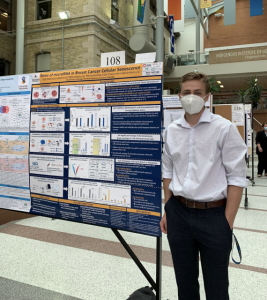A Brandon University (BU) professor and a student will benefit from funding from Research Manitoba to support their work.
Dr. Ellen Watson, an Assistant Professor in the Faculty of Education, is the recipient of a Research Manitoba New Investigator Operating Grant. Reid Opperman, a student in the Master of Sciences (Environmental and Life Sciences) program, will receive a Research Manitoba Master’s Studentship Award.

Dr. Watson will receive $30,107.92 over two years for her project as she studies how teachers’ beliefs shape their knowledge of science.
“In a world rife with misinformation, scientifically literate citizens are more important now than ever,” Dr. Watson said. “Research has shown that students often adopt the beliefs about scientific knowledge of their teachers, but those beliefs do not always align with the nature of science. This research can support the development of education of teachers that assists in orienting their beliefs to align with the nature of science, helping them to educate scientifically literate students.”
Dr. Watson plans to interview current teachers in Manitoba and analyze their responses to find common themes.
Opperman, who is conducting research in Dr. Mousumi Majumder’s lab at BU, will receive $12,000 to support his work on the effects of micro-RNA on cancer stem cell reprogramming in breast cancer.

Opperman points out that one of three main outcomes in tumours follows cancer treatment: the cancer cells will die; they will continue to divide if they resist therapy; or they will enter a state called cellular senescence., where the cancer cells would not grow or divide.
“Senescence is thought to be a cancer-preventing mechanism and is regulated by genes called tumour suppressors,” Opperman said. “Some studies have indicated that it could be beneficial to promote senescence in tumour cells during chemotherapy. But there is a complex relationship between senescent tumour cells and cancer stem cells, or CSCs. CSCs are therapy-resistant tumour cells responsible for cancer remission. Research in our lab has shown that some micro-RNAs released by aggressive tumour cells can promote cancer by targeting the tumour supressors and enhancing the growth of CSCs. We are investigating the secretions of tumour cells to understand the mechanism if MiRNA regulating tumour cell senescence and therapy resistance.”
The results of the research could be used to discover therapeutic targets for treatment and to discover blood biomarkers to monitor therapeutic progression.
“These are exciting projects with the potential to bring incredible benefits to our communities,” said Dr. Heather Duncan, Dean of Education and Associate Vice-President (Research) at BU. “These are excellent examples of the important work that is taking place within our faculties and of the opportunities that we are providing for our students to do meaningful research. I’m grateful to Research Manitoba for their continued support of new discoveries at BU.”
Contact
- Brandon University
- communications@brandonu.ca
To receive any BU publication in an alternate format please contact Communications@BrandonU.ca
About BU
Success is built at Brandon University. Our growing, progressive campus welcomes a diverse and inclusive community that combines proud tradition with shared ambition. Through our excellence in teaching, research, and scholarship, we educate students to make a meaningful difference as engaged citizens and leaders. Join us at BrandonU.ca.